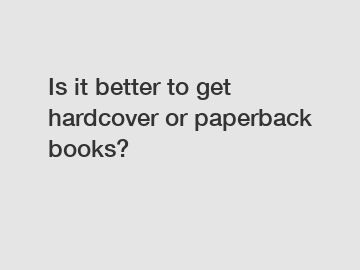Is it better to get hardcover or paperback books?
Is it better to get hardcover or paperback books?
When it comes to choosing between hardcover and paperback books, avid readers have engaged in a long-standing debate. Each type of book has its own unique advantages and disadvantages, making it a subjective decision for book lovers. In this article, we will delve into the pros and cons of both hardcover and paperback books, allowing you to make an informed decision on which format suits your preferences and needs.
1. Durability and Longevity:

One of the most significant factors to consider when selecting a book format is durability. Hardcover books are known for their sturdiness due to the rigid exterior covers. They are designed to withstand wear and tear, ensuring that the book remains in excellent condition for a longer duration. On the other hand, paperback books, with their flexible and lightweight covers, are more susceptible to damage. Frequent use or even a mishap like accidentally dropping the book can result in creased or bent covers. These damages may seem minor, but they can gradually affect the overall condition of the book. Therefore, if you aim to build a lasting personal library or plan to read the book multiple times, hardcovers offer better longevity.
2. Portability:
Portability is another crucial aspect to evaluate when deciding between hardcover and paperback books. Hardcovers are typically larger and heavier, making them less convenient to carry around. Their weight can be a nuisance when traveling or commuting, particularly if you prefer to read on-the-go. In contrast, paperbacks are lightweight and compact, allowing for easy transportation in bags or even pockets. If you are someone who enjoys reading during commutes or while traveling, pocket-sized paperbacks would be the ideal choice for you.
3. Cost:
Cost plays a significant role in the decision-making process for many readers. Hardcover books are generally priced higher than their paperback counterparts. This higher price is attributed to the use of sturdier materials, as well as the aesthetic value associated with hardcovers. If budget constraints are a concern, paperbacks are undeniably the more economical option. They are not only cheaper to purchase initially but are also more likely to be available at discounted prices, allowing you to expand your reading list without burning a hole in your pocket.
4. Aesthetic Appeal:
For some readers, the physical appearance of a book is of utmost importance. Hardcover books often boast eye-catching designs, embossed or foil-stamped titles, and vibrant dust jackets. The sophisticated appeal of hardcovers contributes to their popularity among collectors and those who value the aesthetic beauty of literature. Paperbacks, although less visually striking, can still be appreciated for their simplicity and practicality. Moreover, their flexibility allows readers to perceive the book's condition and read without removing any protective layers. Ultimately, the choice between hardcover and paperback may depend on whether you prioritize aesthetic value or practicality.
In conclusion, the debate over whether it is better to get hardcover or paperback books ultimately boils down to personal preferences and priorities. Hardcover books, with their enhanced durability and visual appeal, are an excellent investment for avid collectors or those who aim to build a long-lasting personal library. On the other hand, paperbacks provide the convenience of portability and affordability, making them suitable for readers on a budget or those who prefer compactness. Whichever format you choose, remember that it is the content within the pages that truly matters, and the joy of reading remains the same, regardless of the external cover.
For more cnprint, luxury hardcover book printing, linen hardcover book printinginformation, please contact us. We will provide professional answers.


